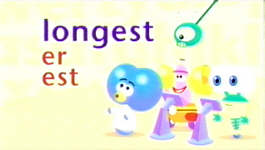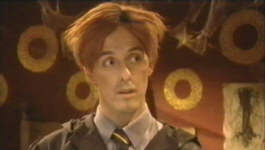
STORY DETAILS
 | ||
| SPELLING... STORY DETAILS |
| SPELLING... |
|
• Index > Introduction > ...Strategies Episodes > ...Strategies Theme Tune > ...Strategies Notes > ...Strategies Pictures > ...Spellits Episodes > ...Spellits Theme Tune > ...Spellits Notes > ...Spellits Pictures > Notes > Links > Picture Gallery |
| LOOK AND READ |
|
• Home > Stories Index > Downloads > Trivia > Schedules > Schools TV > Links > Site Admin (incl. Site Map) |
|
• Email • Discussion Forum • Guestbook • Help Out (Sorry, I can't provide videos or any other materials, so please don't write to ask!) |
| ON TV: | Regularly repeated on BBC Two and the CBBC Channel |
| ON VIDEO: | All available on various videos and DVDs from the BBC |
| > More information on the official BBC Schools Programme Guide | |
 Introduction
Introduction Spelling Strategies
Spelling Strategies|
AKA Spell It Out...
| |
| 1. | Spell It Out 1 |
|
(Eye Spellit: Find the tricky bit / Ear Spellit: Say it silly / Brain Spellit: Make up a mnemonic) The first of three programmes for 7- to 9-year-olds offering hot tips for tackling spelling, with animation, songs and comic sketches. | |
| 2. | Spell It Out 2 |
|
(Eye Spellit: Look out for letter teams / Ear Spellit: Seg-ment in-to syll-a-bles / Brain Spellit: Find little words in big words) In this edition, the Ears take to the stage to spell 'remember' and the Brains daringly break little words out of bigger words. | |
| 3. | Spell It Out 3 |
|
(Eye Spellit: Spot the doubles / Ear Spellit: Talk like Mr Toffee-Nose / Brain Spellit: Look for word families) The Eyes do a double-take when they are faced with double letter words and the whole team get together for some community singing. | |
| > CLICK HERE for the Downloads section, including this and several other theme tunes. |
|
Television has a great gift for explaining and demonstrating the complexities of the English language. In this three-part special, the sometimes frustrating process of learning to spell is given a humorous new dimension through a mix of sketches, animations and practical tips. Written and produced by the team that brought you the BAFTA award-winning* English Express Texts, these enjoyable programmes bring spelling strategies to life for the Look and Read audience. * - they got the 2000 Schools BAFTA for their third episode, Football Texts. Each programme is constructed in short, modular sequences. You can choose to view only the particular point that matches your teaching concerns - or you can view an uninterrupted 15-minute session, revisiting the sequences which help to demonstrate or reinforce selective strategies. The programme will also:
|
 |
 |
| Title caption: the Look and Read name (not even Look and Read Special) is prominent | BBC2 continuity slide: only the Look and Read name is used. |
 |
 |
| Eye Spellit | Ear Spellit |
 |
 |
| Brain Spellit | Control |
 |
 |
| A comedy sketch | Mr Toffee-Nose |
 Spelling With The Spellits
Spelling With The Spellits|
AKA Spelling Rules. The first two episodes are for Year 3s, the next two for Year 4s and so on. So sometimes they get called "Year 3 Programme 1", "Year 5 Programme 2" or whatever. Or other times they use the congregate year groups, like "Year 3/4 Programme 1" up to "Year 5/6 Programme 4". Those below are the on-screen 'titles'. | |
| 1. | Programme One |
| Educational series for 7- to 9-year-olds tackling spelling with animation, songs and comic sketches. This programme focuses on suffixes, prefixes and plural words ending in Y. | |
| 2. | Programme Two |
| This programme focuses on comparatives, superlatives, suffixes and apostrophes. | |
| 3. | Programme Three |
| In this programme, long and short vowels, past-tense endings and suffixes. | |
| 4. | Programme Four |
| This programme focuses on prefixes, suffixes and possessive apostrophes. | |
| 5. | Programme Five |
| Eyes, Ear and Brain deal with plural words with different endings and hard and soft 'c'. | |
| 6. | Programme Six |
| Eyes, Ears and Brain deal with homophones, silent 'e' endings and the 'i before e' rule. | |
| 7. | Programme Seven (Revision) |
| 8. | Programme Eight (Revision) |
| Eyes, Ears and Brain review prefixes and suffixes, words with a final silent e and the use of apostrophes. | |
| > CLICK HERE for the Downloads section, including this and several other theme tunes. |
|
Children can brush up their strategies for remembering those tricky spelling rules with Ears, Eyes and Brain, the animated Spellits characters who use their senses when it comes to spelling. Using humour and surprise, programmes will offer a very wide and vivid range of ways to learn specific spelling rules. These new programmes for Years 3, 4, 5 and 6 use animated characters and comedy sketches to bring the National Curriculum and spelling rules alive. Programmes for Year 6 will recap and reinforce the strategies covered in earlier programmes. This fun and engaging series is directly linked to the N[ational] L[iterary] S[trategy], which requires children to investigate rules and patterns. |
 |
 |
| Title caption: the phrase Look and Read is nowhere to be found and in fact does not appear on screen at all | BBC2 continuity slide using both 'Look and Read' and the unit title. |
 |
 |
| The Spellits investigate superlatives | Paul Bigley (Dad out of Captain Crimson) becomes one of only about five actors ever to have appeared in two unrelated Look and Read stories. |
| > CLICK HERE for more general links about Look And Read and schools TV. |
 |
 |
| An Eye Spellit tip | An Ear Spellit tip |
 |
 |
| A Brain Spellit tip | Mr Toffee-Nose |
| THIS UNOFFICIAL WEBSITE HAS NO CONNECTION OF ANY KIND WITH LOOK AND READ OR WITH THE BBC. The Look and Read title and logo, as well as all related material, is copyright © BBC, 1967-2006. The official BBC Schools website is at www.bbc.co.uk/schools. Everything else on this website © Ben Clarke, 2000-2006. No malicious infringement of BBC copyrights is intended. Material featured at this site remains the property of the BBC or relevant copyright holders. |